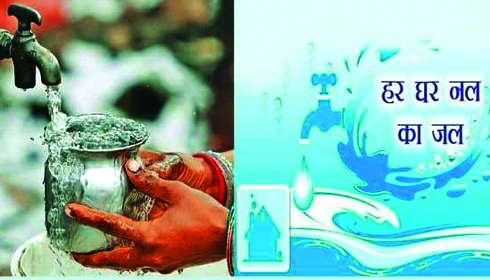
WHO lauds government’s 'Har Ghar Jal' programme on public health
A report released recently by the World Health Organisation (WHO) has hailed the impact of the Indian Government’s Har Ghar Jal programme on public health that seeks to make piped drinking water available to every household in the country.
The ‘Har Ghar Jal’ report, presented during the Union Health Ministry event recently, emphasises on diarrheal diseases as they contribute significantly to the overall disease burden related to water, sanitation, and hygiene (WASH) issues.
The report underscores the urgent need to address these diseases and the potential for substantial gains in public health and economic well-being.
The report finds that in 2018, 36% of India's total population, including 44% of the rural population, lacked access to improved drinking-water sources on their premises.
The report reveals that the direct consumption of unsafe drinking water had severe health and societal consequences. The analysis indicates that in 2019, unsafe drinking water, along with inadequate sanitation and hygiene, contributed to 1.4 million deaths and 74 million DALYs globally.
The Union Health Ministry said that the World Health Organization (WHO) monitors various Sustainable Development Goal (SDG) indicators, including the proportion of the population using safely managed drinking water services (Indicator 6.1.1) and mortality related to unsafe water, sanitation, and hygiene (Indicator 3.9.2). WHO has developed methods and tools to estimate the health gains associated with improvements in water, sanitation, and hygiene, particularly in reducing diarrheal diseases and other related health outcomes.
The report stresses the tremendous time and effort saved for women and girls through the provision of tap water. In 2018, women in India spent an average of 45.5 minutes daily collecting water to meet household needs. Overall, households without on-premises water spent a staggering 66.6 million hours each day collecting water, with the majority (55.8 million hours) occurring in rural areas. Universal coverage through tap water provision will result in substantial savings by eliminating the need for daily water collection efforts.
The report finds that ensuring safely managed drinking water for all households in the country could avert nearly 400,000 deaths caused by diarrheal diseases and prevent approximately 14 million Disability Adjusted Life Years (DALYs) related to these diseases. This achievement alone would result in estimated cost savings of up to $101 billion. The analysis focuses on diarrhoeal diseases as it accounts for the majority of WASH-attributable disease burden.
NITI Aayog member, Dr V K Paul said, “We are witnessing the role of safe drinking water in saving lives, empowering women and girls, and contributing to ease of living.”
“No programme has this kind of direct impact on improving the lives of individuals and families physically, mentally, and financially,” he emphasised.
Dr Rajiv Bahl, DG, said that the Government of India’s investment in the Jal Jeevan Mission has a significant multiplier effect on health, as has been brought out by this study